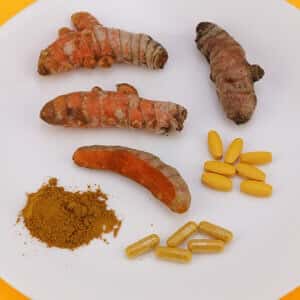
Turmeric, an Indian herb that gives its bright yellow color to curry, is a superstar these days. Scientists have found that it has powerful anti-inflammatory effects (Ooko et al, Frontiers in Pharmacology, Feb. 2, 2017). They are evaluating it as a way to manage musculoskeletal pain (Gaffey et al, JBI Database of Systematic Reviews and Implementation Reports, Feb. 2017). Other researchers think it might reduce the risk of dementia (Mirmosayyeb et al, International Journal of Preventive Medicine, Feb. 7, 2017). We are enthusiastic about its potential uses. We worry, however, about a possible turmeric interaction with anticoagulants.
Is There a Turmeric Interaction with Plavix?
Q. I started taking turmeric to fight inflammation and got a nasty surprise. I began bleeding at the slightest scratch.
It took me a while to figure out that the herb was interacting with the Plavix I take to prevent a blood clot. I often didn’t even feel the scratch, but it would bleed profusely.
I was taking high-grade turmeric capsules. I wish I could use turmeric instead of Plavix, since I can’t take NSAIDs for my arthritis. I hope this information helps someone else.
Turmeric Interaction with Warfarin:
A. We have heard from readers taking the anticoagulant warfarin (Coumadin) that turmeric can increase the risk of bleeding. In the laboratory, this spice can keep blood platelets from sticking together to form clots (McEwen, Seminars in Thrombosis and Hemostasis, April 2015).
Yours is the first report we have received of a possible interaction between turmeric or curcumin and clopidogrel (Plavix). Its effect on platelets suggest that turmeric or its derivative curcumin might interact with other anticoagulants as well.
Other Adverse Effects of Turmeric:
Although the anti-inflammatory activity of turmeric can provide relief for sore joints, some people have experienced digestive distress or an allergic reaction. Here are a few of their reports:
“I’ve been taking turmeric for psoriatic arthritis that has made my hands dry and my fingertips split. I have been taking two pills a day.
“I have noticed an itchy rash on my arms that I didn’t have before. Although the turmeric has helped my skin and the arthritis pain, I am worried that it may have caused the rash.”
Here is another reader’s reaction:
“I tried turmeric for its health benefits last May. In June I developed serious rash and itching on my chest and neck. I stopped the turmeric and it cleared up. I looked in your book and noted that some folks said they had a similar reaction to the spice.”
We have long been warning those who must take the anticoagulant warfarin (Coumadin) to avoid turmeric. Your experience suggests that other anticoagulants might also be incompatible with this spice.
You can learn more about the research on curcumin and turmeric for fighting cancer in our Show 988: Spices for a Healthy Life. In it, we interview Ajay Goel, PhD, of Baylor about his groundbreaking research.
Revised 3/6/2017

